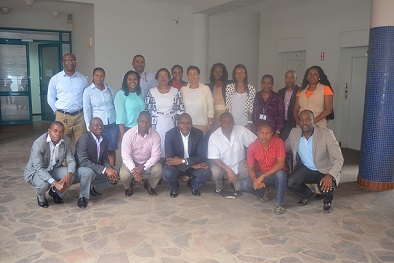The event was also attended by five strategic decision makers, namely: DNA, Roads Fund (Fundo de Estradas - FE), Ministry of Energy (Directorate of Planning), Water Research Institute (Instituto de Investigação em Águas - IIA), and International Rivers Department (Departmento de Rios Internacionais.
The 15 participants who attended the training workshop included 9 were women and 6. The range of participants comprised: (i) Planners engaged since January 2014 in the first four national training workshops and the in-between training-workshops mentoring process activities and on-job trainings; and (ii) Strategic Decision Makers; the WACDEP-Mozambique Management Team with the Programme Manager, the National Training Coordinator (NTC), the 3 Trainers-Mentors ; and partners.
This fifth training workshop aimed at: (i) developing the ability of participating planners to monitor and evaluate progress and lessons learned from applying the Water Security and Climate Resilience Development - Framework approach and to provide feedback for future iterations and applications; and (ii) providing knowledge to participating Strategic Decision Makers about the Framework, climate resilient planning, and how they can apply it.
During the workshop Participants Planners shared some outputs drawn from the application of the framework and knowledge gained through the first four training workshops and the mentoring support provided by the NTC, the 3 Trainers-Trainers and other WACDEP-Mozambique Management Team members. Those outputs included the following two projects elaborated by trainees:
- Mainstreaming climate change into Urban Flood Management Practices, the case study of the Municipality of Pemba. This 2 year project (2016 – 2017) costing USD 2.500.000 will contribute to enhance capacities related to urban flood management and rainwater harvesting for strengthening the water supply system in the Municipality of Pemba. The potential funders of the project are the Global Environment Facility (95%) and budget of the State of Mozambique (5%).
- Building climate change adaptation infrastructure: the case of Simbe’s Dam. The project is aiming at integrating climate change adaptation into the planning and the construction processes of water related infrastructures through the case of Dam of Simbe.
The implementation of the programme continues until the end of June 2015 through the mentoring process activities and on-job trainings and on-line Pan African Group discussions on water security and climate resilience related thematic relevant to the trainees.
Through the collaboration formalized between the United Nations Institute for Training and Research (“UNITAR”) and the WACDEP Africa Coordination Unit, the trainees will have an opportunity to write an exam in June 2015 and to be issued a UNITAR certificate for successfully completing the WACDEP Capacity Development programme on the “Economics of Adaptation Water Security and Climate Resilience Development”.
